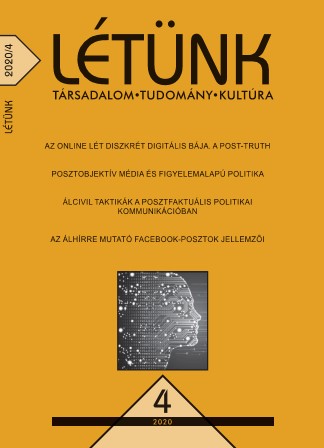A HÍRMÉDIA HITELESSÉGI VÁLSÁGA
The authenticity crisis of the news media
Author(s): Mónika AndokSubject(s): Media studies, Theory of Communication
Published by: Fórum Könyvkiadó Intézet
Keywords: fake news; reception; authenticity; representation; ritual model; agenda setting
Summary/Abstract: The aim of the study is to show and analyse the emergence of fake news in social media in a new theoretical framework. The author is convinced that the post-truth concept is not the right path to raise the question, as the concept of truth does not belong to the field of media theory. Instead, the topic is approached from the perspective of representation and the spread of fake news in online media is conceptualized within a crisis of credibility. The author interprets authenticity as a social construction that is created differently in each culture and media history era. However, the different constructs of authenticity were identical in that an institutional element and a textual strategy element could be explored in the process of their creation. In the age of digital networks, the credibility-constructing strategies of professional news content producers are also imitated by fake news creators without their contents being truly authentic. And news consumers accustomed to old credibility markers will be misled and deceived in this way. The ritual model of communication is chosen by the author as a theoretical framework, which can be used to describe the dysfunctional work of fake news from the aspects of attention control, framing, false experience and the sign of external and internal boundaries of social reality. In addition, the author presents Warde and Derakhshan’s research on fake news, which covers both the structural and dynamic elements of the phenomenon. In support of the theoretical concept, several researches are cited by the author, for example the data of the Digital News Report published by the Reuters Institute for recent years, in both international and Hungarian terms. She also covers reception studies and agenda-setting researches specifically focusing on fake news. Finally, the study lists some possible solutions for the problem of this phenomena.
Journal: Létünk
- Issue Year: L/2020
- Issue No: 4
- Page Range: 107-125
- Page Count: 19
- Language: Hungarian

